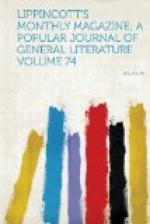A hearty laugh followed, and, their blood having got bubbles in it by this time, a general assenting murmur was heard.
The next instant a shriek, sky-rending, blood-curdling, savage beyond description, went up,—a truly terrific yell in peace, and enough to create a panic, one would think, in the Old Guard in time of war.
“Thank you, thank you. I am entirely satisfied" said Sir Robert, in a comically rueful tone, as soon as he could say anything for the uproar. “I never imagined anything like it, never. Where did you get it? Who invented it? Is it an adaptation of some war-cry of the North American Indians? It sounds like what one would fancy their cries might be, doesn’t it? It has got all the beasts of the forest in it; and I confess that I for one, would have fled before it and stayed in the wagons as long as there was the slightest danger of hearing it. By Jove! it must have been heard in Boston when given in Virginia. It is curious how very ancient the practice of—”
But the company heard no more of curious practices, for their yell had been heard, if not in Boston, in a far more remarkable quarter,—namely, by the police, who now rushed in, prepared to club, arrest, and carry off any and all disorderly and dreadful disturbers of the peace.
If Sir Robert had been in any danger of being murdered, all experience goes to show that no policeman could have been found before the following morning, and then only in the remotest part of the city. As he was merely being wined, dined, and amused, quite a formidable body of these devoted but easily-misled guardians of respectability and innocence poured into the room, where at first they could see nothing for the smoke. Matters were explained, they were invited to “take something” before they went, and took it, and, quite placated, filed out into the passage again, and from thence into the street.
Sir Robert sat up late that night, or rather began early on the following day, to copy the stories he had most relished into the diary, and do what justice he could to “the rebel yell,” and, having added an admirably discriminating chapter on “the present political situation in the States,” concluded with, “How striking is the good sense, the good feeling, that both the conquerors and the conquered have shown, on the whole! In other countries, how often has a war far less bloody and protracted left in its wake evils far greater than the original one, in guerilla warfare, murders, ceaseless revolt, and smouldering hatred lasting for centuries on one side, and centuries of tyranny, oppression, executions, confiscations, on the other! A brave and fine race this, not made of the stuff that goes to keep up vendettas, shoot landlords, blow up rulers, assassinate enemies. They can fight as well as any, and they have shown that they can forgive better than most,—taken together, true manliness. It may be that they are influenced by a consideration which is said to be always present to an American,—’Will it pay?’ and of course so practical a people as this see that anarchy doesn’t pay; but I would rather attribute their conduct to nobler, more generous motives, and in doing this seem to myself to be doing them no more than justice.”




